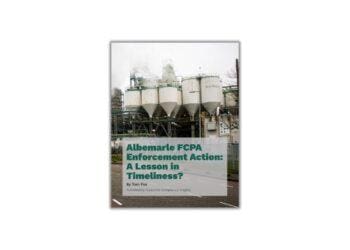How Sexual Harassment is Changing American Compliance
Corporate compliance has been around for decades – sexual harassment for much, much longer. Why the sudden paradigm shift from just awareness and acceptance to mandated compliance?
The #MeToo movement sprung up as a grassroots movement nurtured in the current fertile soil of social justice. Its potential unleash of power on ordinary employees is a groundbreaking step forward in making the world a better, safer place.
Corporate compliance programs, on the other hand, once found primarily in highly regulated industries (pharmaceuticals, health care, financial services and energy), began to gradually ingratiate themselves into a wider range of organizations as more and more federal laws (i.e., those relating to environmental protection) began to dot the corporate landscape. No longer was compliance an exception, but, a stepping stone to corporate success. The concept of a compliance program as self-policing mechanism to mitigate risk and offset litigation was up and running.
The enactment of the Foreign Corrupt Practices act (FCPA) branded 1977 as a watershed year for American compliance. Evidence of executives misusing corporate funds for illegal purposes turned public attention from the atrocities of the distant Vietnam war to the fires burning close to home: the cooking of the corporate books.
In the fervor of the post-Watergate era, the atmosphere was more than ripe for the public to embrace the concept of corporate and civil liability. Amidst the clamor for some type of ethical standard and accountability, the FCPA was laid down as the bedrock for all anti-corruption law going forward. First a slow-moving breeze deterring corporations from committing blatant or subversive acts of corruption, the winds of compliance grew in their intensity against the background of global unrest and stirred U.S. lawmakers to whip up sanctions and other measures to protect American interests worldwide.
Even after 1977, corporate America was still not standing on solid ground. Rocked by a sharp rise of high-profile business scandals throughout the 80s, 90s and 2000s, the legislative noose around the corporate neck tightened. Trembling in the wake of such public scandals as Enron Corporation and Tyco International plc, corporate investors demanded swift overhaul of regulatory standards. This outcry in 2002 led to the drafting of the Sarbanes-Oxley Act, which mandated strict reforms concerning financial statement disclosures and their accuracy.
A legislative aftershock known as FSGO (Federal Sentencing Guideline for Organizations) soon followed in 2004, (amending 1991 guidelines), whereby companies were now required to evaluate the effectiveness of compliance and support ethical behavior. On the heels of the Great Recession came Dodd-Frank (2010), putting strict regulations on the financial and mortgage industry and attempting to rein in the wolves of Wall Street. It is no surprise, then, that corporations are committed to devoting internal resources to monitoring compliance with legal requirements. After all, something must serve as an internal buffer to guard against the perils of human behavior that could potentially put an errant corporation (and their investors) six feet underground.
It’s a hard truth, but let’s face it: Compliance was never a sexy topic. And it never really came from within the body of the corporation, but from the powers above governing the land. SEC, finance, fraud, corruption – this traditionally has been the stuff of American compliance in the workplace and, most of the time, did not involve any real passion. The compliance requirement trickled down from the top of the mountain and landed at our feet, so we grudgingly picked up our shovels and got to it – if we wanted to keep our jobs.
Not so with the #MeToo movement and its subsequent sexual harassment prevention legislation. An avalanche of truth rose up in a firestorm of tweets and videos since October 15, 2017, when actress Alyssa Milano gave voice to the hidden, pervasive reality of sexual harassment. That, in turn, has prompted the wheels of the law to start rolling.
New York City and State have already passed a flurry of new sexual harassment compliance and training requirements in the wake of #MeToo, with more states and localities soon to follow. There are even whispers of a push for new federal regulations on sexual harassment, should Congress change hands in November. But whether mandated by their city, state or Congress, businesses must start actively training all their employees, not just supervisors, with programs that actually prevent harassment and give a voice to those who experience it.
Sexual harassment training has been part of corporate culture for decades, but it’s never been a legislative requirement, until now. It’s also never worked. The numbers of sexual harassment complaints received by the EEOC every year has not dwindled. Training has often focused on narrow, legalistic definitions of harassment, not the real stories and hard-hitting experiences that people face in a workplace.
American compliance grows out of the seeds of public outcry. From corporate scandals in the 70s leading to the FCPA to sub-prime mortgages precipitating a recession and a flurry of regulations the likes of which the U.S. had never before seen, the cycle is clear: Outcry leads to legislation which leads to businesses being mandated to sit up and pay attention.
A company that requires its employees to undertake bribery training that doesn’t work is not going to be left with much of a defense when hauled in front of a federal judge to answer for alleged crimes under the FCPA.
As sexual harassment moves into the realm of compliance, companies will have to sit up and pay attention to the efficacy of sexual harassment training programs like they would FCPA compliance. A training program that doesn’t prevent the thing it is designed to prevent does not work. And as this topic becomes one of the myriad of legally mandated compliance training topics businesses are required to train on, hiding behind shoddy, outdated training just won’t cut it anymore.










